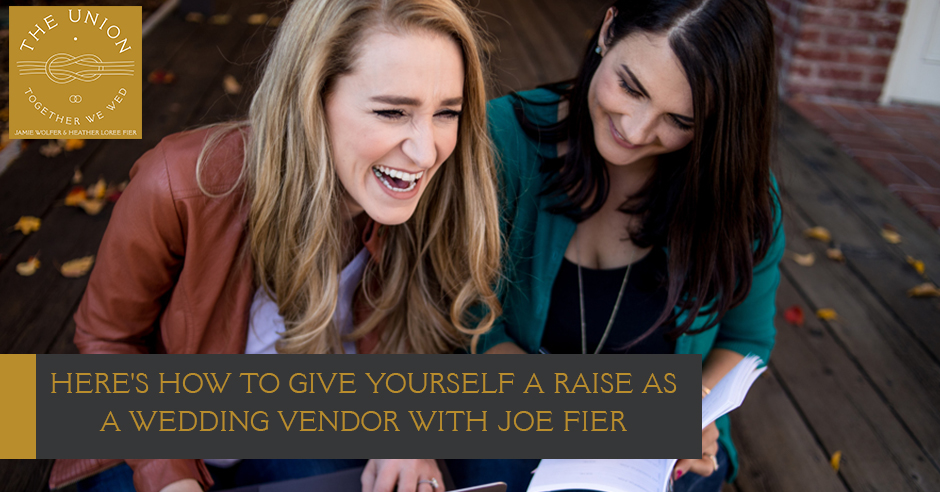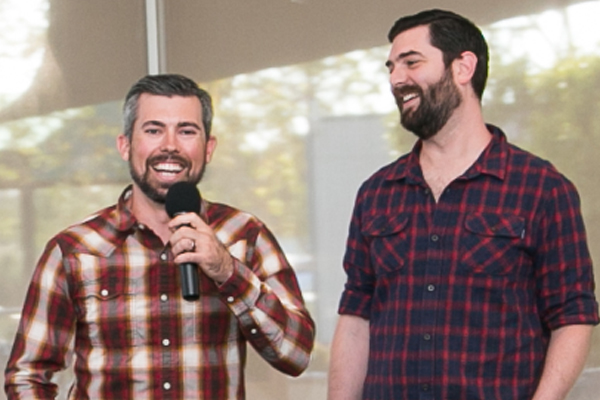
Ready for a raise? Jamie Wolfer and Heather Loree Fier have said it before, but today they’ll say it again… it is time to lean into digital marketing and develop a community to fuel your business. Jamie and Heather brought in an expert on developing raving online fans to share some wisdom with you all. His name is Joe Fier. Beyond being an investor, marketing expert, and podcast host, Joe is also Heather’s husband. This episode dives into techniques to grow an online audience that will fuel your business and profits.
—
Listen to the podcast here:
Important Links:
- Joe Fier
- The Hustle and Flowchart
- Facebook – The Hustle & Flowchart Community
- Loom
- TheUnionPodcast.com/groove
- Rev.com
- www.TheUnionPodcast.com/groove
- https://EvergreenProfits.com/category/the-podcast/
About Joe Fier

Joe Fier is an investor, advisor, and an affiliate marketing expert. He consults and creates long-term selling assets for clients, which has generated over $50 million in revenue online. He and his Co-Founder at Evergreen Profits, Matt Wolfe are hosts of the Hustle and Flowchart Podcast.
Here’s How To Give Yourself A Raise As A Wedding Vendor With Joe Fier
Jamie: This is one that I have been waiting for such a long time. There is a reason that Heather is a master and a pro at all things digital marketing. That’s because she stole a bunch of these ideas from her husband. We roped him into it. We have Joe here joining us to talk about digital marketing and why, as a wedding vendor, you should be doing it too.
—
Heather: We have a special guest. There may be a little bit of nepotism here. My husband, Joe Fier.
Jamie: Welcome, Joe. Thank you for joining us, although I’m sure you didn’t have a choice.
Joe: I had no choice. The baby is going to grandma and you’re coming to my office.
Heather: We are excited to talk to you because all of the knowledge I have of the digital marketing world comes through you. We thought, “Why don’t we tap directly into the source here and get some good knowledge.” We’re hoping you can drop some knowledge here.
Jamie: There’s been a lot of pressure build-up to this. It was literally in the middle of another one of these episodes, she keeps mentioning things that you’ve taught her. I wrote down, “Interview Joe,” and underlined it 72 times as she’s talking. I almost borderline interrupted her and was like, “We got to interview Joe. We’ve got to get him on.”
Joe: She’s told me about that. I’ve been looking forward to this too because I know you guys have been crushing it. You guys ran with this and we were talking about it. Most people are not consistent with amazing content like this. You guys are. No question. You ran with it and stayed up with it.
Jamie: Heather, did you pay him to say that?
Heather: I also pay him to say nice things and then it cost me a lot of money to get all these compliments.
Joe: She’s kicking me under the desk and be like, “Keep saying good stuff.”
Jamie: Honestly, that’s mighty high praise coming from you because this is what you do for a living. That might be a broad stroke.
Joe: Our show is the number one piece of content or the way we create content, it happens to turn into hundreds of other pieces of content from the audio recording. Sometimes we do video, but that turns into things like emails and ads on social media and videos, animation, all sorts of blog posts.

Grow An Online Audience: With podcasts, it’s like you’re talking to a single person all the way every single time because they’re listening with their earbuds or they’re alone in their car.
Jamie: Have we said the name of your show yet? I don’t think we have.
Joe: It’s called The Hustle and Flowchart. It’s for small business owners and people that have an interest in online marketing, but also other cool stories from entrepreneurs that we’re bringing on there.
Heather: Yes. It’s an interesting show. Every time I listen to it, I have a new idea of how to market and how to build the business in a new way. It’s cool. There’s a question Joe gets asked by every single relative and friend. “What the heck do you do to make money, Joe? How does that work?”
Joe: It feels every single time I explain it, people get cross-eyed. They’re like, “How does that work?” The most public part of what I do is the podcast. That’s the obvious thing. At least my mom can understand that. Other than that, then it turns we have a membership site and a physical newsletter on the back end of the podcast. That’s our VIP basically. For $15 a month or $59 a year, they can get access to more exclusive training from us and also people that have been on our podcast. Things like twenty-minute videos of a screen recording of some cool strategy that someone talked about, but they couldn’t walkthrough. We send the physical newsletter in the mail to subscribers that are basically the notes from each episode. We have a note-taker taking notes on this stuff. It’s Cliff Notes versions of each episode of takeaway. That’s cool. Still, I have not seen other podcasts do that. Pretty much every podcast that hears it says exactly that, like, “What?”
Jamie: Why aren’t we doing newsletters?
Heather: We’re in year one. Let’s roll it out. Everybody, watch out for the newsletter.
Joe: It would be super valuable for you, guys. Readers, write back to Jamie and Heather and tell them what you think. It’s cool. There’s so much value there and think about it. That’s all produced from the time we’re talking. It’s produced by someone else on our team and that can be produced into eBooks. We’ve created podcast books from that or online traffic books. You can repurpose it crazy, but the bulk of our income. Talking about the money side of things, that’s affiliate marketing. Most people are probably like, “What’s content marketing?” That is typically the next question, “How do you make money?” Typically, people see our podcast and all this stuff.
We have a Facebook group. That’s got something 2,000 people that that’s growing quickly. It’s not obvious how we make money, but it’s affiliate marketing, which is basically selling other people’s products or services. We get a percentage of that sale. We’re promoters more than anything. We like to talk about cool stuff that we use or things we’re seeing in the market that can help people. We evangelize other people’s stuff and get paid for it. I do add my own stuff. It’s weird. I always had a hard time. My business partner and co-host, Matt Wolfe, we could sell stuff, but I don’t know if we chicken out or something on our own products and offers. We don’t lean into it as hard as someone else’s stuff. It’s way easier for us to do that. We’re like, “Let’s make that business model.”
Jamie: That’s funny because I have a hard time talking about my course. I don’t want to be spammy. I don’t want to be overly self-promotional. I bring it up maybe once every sixth video. I don’t talk about it that often because of one comment that I got from one person on one video and it scared the heck out of me. I do hear that because that’s hard. It’s hard to talk about your own stuff, but to sell somebody else’s stuff, especially if you like it, why is that much easier?
Joe: I know Jamie you’ll do some sponsored stuff here and there. Is it way easier to talk about that stuff when there’s like, “This is our thing. You’ll love this thing. Talk about it, please.”
Jamie: In the last few years, I’ve done three sponsor things in total. It’s few. They’re all things that I’ve used and enjoyed and believe in.
Joe: Part of our model is sponsorships as well. On our podcasts, we do occasionally bring in sponsors. They always have to be a good fit and they’re always something we’re using too. It makes it much easier.
If you want to build trust, put your best content out into the world and give away your trade secrets. Click To TweetHeather: I only to talk about what I would recommend to my closest friends and that’s the way to be authentic. Joe, being authentic and having a community who loves you is your thing. You’re the guy that every person needs and then comes to the side to me. It’s like, “I’m going to be best friends with Joe.” I’m like, “Another one. He’s got many of these best friends, this guy.”
Jamie: Which is funny because before we started, I told my husband that I was with both of you. He’s like, “Say hi to Joe for me.” Joe got another one.
Heather: He’s got a special thing about him to make friends instantly. Is there any that you can tell us? How to build this following? How are you likable? How do you do it?
Joe: You tell me. Maybe it’s a little more obvious since you’ve seen it in action.
Heather: It’s like magic. I don’t know.
Joe: It is weird. There was one time where we were hanging out with our friend to watch a sports event. That was our friend who used to work for the FBI. She is now working with the sheriff. She was watching how I was interacting, mirroring people without knowing and thinking. If you don’t know mirroring, it’s like literally I was standing in the kitchen while having a conversation with her husband. I was leaning on the counter when you lean on the counter or scratch my chin when he would scratch his chin. I’m not thinking about this. That’s the weird thing. I’ll take a drink, and he’s taking a drink. I’ll notice when I take a drink, he’ll take a drink. That’s when I know, “I got you.” It’s not on purpose. That’s the weird thing. It was only because she called it out to you. What did she say to you?
Heather: She said to me, “What is the deal with Joe? How is he good at mirroring people and getting them to like him?” She basically called it out and was like, “He’s tricky. How is he doing this? What is his ploy?” I’m like, “I don’t know. It’s nice.”
Joe: It’s more than that though. I don’t know what it is, but it comes into being situationally aware. I’ve got to debug that one. Dig into it.
Heather: You do this online too. You have this big community that loves you and loves Matt. How do you guys do that? How do you draw in this community on a bigger scale for those of us who don’t have this natural ability?
Joe: A lot of it is personalization and speaking to individuals but in mass, if that makes sense. It starts with a podcast. I would say talking about the benefits of a podcast is you got to think about how people are listening. People are listening with their earbuds. They’re not listening when they group of ten people in their living room. Maybe in a car, but let’s say you’re not listening to a podcast, typically in a car with a bunch of other people. It could happen, but you’ve got to be all interested in the same exact thing.
Jamie: You don’t look at it as a group activity.
Joe: Think of the power in that, because now you’re talking to a single person all the way, every single time, and typically podcasts are at least 30 minutes. I know you can go longer. Mine is at least an hour. Look at Joe Rogan, for instance. He has three-hour long episodes. The guy signed the biggest deal in podcasts. Some were saying between $100 million to $200 million. Thinking about the power of this medium and how a lot of people would go to him for like that’s their best friend when it comes to optimization or fighting sometimes. That’s the case with how we do that on a scale with podcasting. It’s an intimate medium, you’re talking to a single person. You can compare it to Facebook videos. I don’t know YouTube videos and I’m not bashing videos at all, Jamie, sorry. There was a Facebook stat. It was like if you have 7% to 10% engagement on your video, you’re like a rock star on Facebook. Our engagement on our podcast is 80% to 90% for an hour-long episode. Ours is slightly higher, but the standard is about 75% or so, which is insane.

Grow An Online Audience: The wider the net of trust you build, the more qualified leads you’ll have and people who are going to pay attention to you and your core offerings.
Heather: People reading love to spend the QT, this Quality Time with us here. You develop rapport with an audience that you connect with them and over time they’re your friends.
Joe: We’ll do a lot of events. We’ll go to conferences locally. We’ll do virtual things as well. When people message us because we’re constantly prompting people to email us or message us their thoughts and suggestions. They talk like us. That’s what’s weird. We’ll bring in some leaders of multimillion-dollar companies and they’ll reach out to us or we’ll meet them. Some high-power attorney, for instance, will be at our masterminds. These people are talking like bros, “What’s up, dude?” There’s no barrier. There’s no like, “Nice to meet you.” The barrier has been crushed. We’re already buddies, even though we’ve never met them. It’s weird at first. Jamie, I’m sure you’ve received that with YouTube and people that meet you or YouTube fans because they’ve seen you so much. Have you experienced it?
Jamie: I’ve got the fangirl situation a few times, which is sweet and humbling, but I’m almost like, “I burped in the car on the way over here. I promise I’m normal.” What I have experienced, at least from a vendor standpoint, a lot of them would be like, “What’s up?” Almost the way that Heather and I connected. We have the same mindset, we’re on the same page, “Rad to meet you.” That’s definitely been the case there.
Joe: That’s what I’m more thinking of. A lot of people can use things like podcasts or YouTube and Facebook videos, whatever. Anything that’s a personalized medium like that did that allow you to create fans almost en masse and without a ton of personal time attached to it. Everything we’re doing in terms of community building with a Facebook group, we do a lot of that and get personalized when people are asking. When people ask for sales questions, for instance, on products, I’ll send them a personalized Loom video.
That’s an awesome app for anybody. You guys talked about that before. It’s literally recording a video on your phone or on your desktop, your laptop, whatever, and send it in an email. Imagine if you started sending those instead of a typical stocky image or canned email. It takes a little extra time, but when I send those things, people were like, “You did this for me.” It could be answering simple question support sometimes. Usually, I’m too lazy to write an email. People are blown away and people don’t forget that. That creates friends as well.
Heather: That’s powerful with your business, these affiliate promotions to different products, but how would this be powerful for a local vendor or a local florist? They don’t necessarily need people all over the world fangirling. There is power in this. What are some of the things you could see coming from the audience-building online?
Joe: Anything online is done for me. I don’t have borders. I don’t have towns specifically that we target. The same thing could be applied locally. I would figure out what to build. We have this BAM model, which is Build Authority and Monetize and I can break those down too. The building phase is what we’re talking about here. I would choose what the way that you’re going to communicate en masse. Hundreds, thousands or millions of people don’t need to be. Locally, it could be. It doesn’t matter the size of the audience. It’s what the quality of the communication there is. The podcast could be cool, even on a local level. There’s nothing wrong with that. San Diego Photography Podcast, many people will listen to that. You can leverage things like Google to get ranked and you can use that to leverage PR and some of the things that we’ve talked about growing your authority.
Jamie: You know that one specific phrase, “Communicate en masse.” I hope that resonates so hard with readers right now because before, we’ve talked about advertising online and taking control of it. Not going to those big box stores versions of websites and paying money to be advertised there, but how you can handle your own communication en masse. That’s huge.
Joe: I like what you said there, the whole big box relation because now more than ever, everything is speeding up. The little guy and the little business, me included, were all included in this. Most of us are not going to get as much love from places like Facebook, Google, and Yelp and all these. You have to pay to play to stand out there, unfortunately. It’s going to get worse for the little guy. You got to think this is 80/20 Rule. Eighty percent of the problems that Facebook or Google experience when people are trying to run ads and complain because then you get approved or whatever, and they’re like, “I have some issue.”
They’re dealing with the big box stores because that’s how they’re making 20% of their problems, but 80% of their income. It’s this whole thing. It’s a harsh reality. That’s slimming down in favor of the big boys and girls, not us. Anything you can do to control the communication in something like a podcast where you own it or these other places where you can even tap into platforms like YouTube and Facebook. Facebook Groups, for instance, you have to pay for it now. They’re giving you a lot of free exposure. Those are places where you can own the communication channel or less.
Heather: I’m also thinking beyond having that communication in your voice heard, that being heard opens up potential relationships and deal flow in ways that are well beyond the borders of what you consider your current business. That’s something you do well. It’s not affiliates situations, but all sorts of opportunities have opened up for you. Can you talk a little bit about that? It would be interesting to our readers.
Joe: Thank you for setting me up. My model is we promote other people’s stuff and these things that would be promoted typically are software tools. In my case, it’s like I’m speaking to an audience of business owners who I want to make more money with their existing business. They want to save time. They want it to be more efficient in what they’re doing in general. We typically pair it up with a tool, a software that will achieve all that stuff for whatever use they want or they need. What we’ll do is we’ll sometimes bring the owner of that software onto our podcast or we’ll do a video interview and put it onto our Facebook page, on YouTube, to the group. Essentially introduce that person in that concept and that way of thinking and that solution to our audience.
If you want to build trust, put your best content out into the world and give away your trade secrets. Click To TweetWe don’t always use every single thing that we’re going to bring them on for it. It couldn’t be like, “This is brilliant. This is interesting to us. We want to present this as an option.” If you believe in it and all that stuff, it could potentially turn into something that you want to push to your audience as a solution. Even if it’s not a publicly-created affiliate program where it’s officially you sign up for this and you can now make 50% or 10% of the sale. You can reach out to that person, whatever company. It could be a vendor locally. Service providers, say you’re a florist and you want to promote a photographer in your area. Call them up, strike a deal, reach out to the one you want or maybe five of them out there and see what options are available.
You can live in your lane as the photographer and be good at a photographer thing, but still grow this tribe that trusts you and looks to you for advice on solving their other issues around weddings. You can extend that until outside of weddings as well. There are holidays and things like that, that happened during the duration of your planning year. Why not start to recommend cool holiday events? Maybe there are restaurants that you can barter with and say like, “There’s a cool restaurant down the street that will be great for Mother’s Day or Valentine’s or Christmas.” With affiliate marketing, you split revenue, you can do barter deals, which basically trades value, something that you want. It’s usually something that other people have. If you do a deal, you’re usually solving a problem that they have, which is send them customers. You’re doing the marketing for them and you can work a deal out there in exchange.
Heather: Some of these deals for you have even turned from the affiliate angle too, like being an investor or an advisor or a partner in the business. That’s interesting too. I feel in this industry, a lot of folks think the only way to make more money is to go more premium and move their way up the pricing ladder, do the higher-end weddings. If you’re playing wide with your business and you’re connecting and networking with others in this industry and finding ways to build together, you can then scale in a totally different way and not necessarily have to put yourself in a higher price point. You can. Sure. This is something in addition to that which can bring in so much more value to your business and also multiple revenue channels, which is a huge thing. That’s powerful.
Jamie: I know for many vendors reading this, they’re like, “The pivot scares me. I don’t know what that looks like. I don’t know how to make that work.” “I don’t want to touch affiliate links. They scare me and I don’t even know what that means. I know somebody explained it four times in this episode, but no thank you. That overwhelms me.” What would you say? What are some other benefits that may not necessarily be affiliate links or as potential monetization options or revenue streams? What else are they getting out of building this community?
Joe: That’s a super common thing. I’m going to answer your question first, Jamie, and then have some thoughts around what you were saying too, Heather. It’s funny because we’ll talk to anyone out of our space. We’ll talk to agency owners a lot of times and this is for business owners. You have a design agency in terms of website design or some other advertising agency. A lot of them are scared of that pivot. They understand it, but they don’t see how it can fit in their business. I would challenge everyone here that basically it was like, “You were amazing at this one thing or maybe a handful of things. You can be great at everything.” You have a core ability.
You can’t do it all, but what you can do is create trust with the people who are coming to you and spending all of this time reading this, watching your YouTube videos, your channel, reading emails, and all that stuff, going through your training course. Heather, like your expo, these are all prime examples. You’re not only talking about the one core thing that you’re doing. Jamie, you’re talking about all sorts of different cool things people can do with flowers or different tools and things and locations. Heather, you have speakers on your expo that are talking about all sorts of different expertise, things like relationship coaching and all that stuff. You’re not going to be the relationship coach in your scenario, but you can see that those people can be a good solution to my people’s problems.
You don’t have to monetize everything, but if you chose to, you could say, “Why don’t we work a deal out here?” I don’t know what that looks like. You make it a win-win for both parties, but that’s no bolt-on to what you’re doing already. It should not change your core focus. The last thing I would say is to change your whole business model and pivot. You don’t have to do that. You can see this as almost like, “Here’s an additional layer of solutions I can recommend to my core audience that knows and trusts me.” The other thing, because people are scared to send some of their best clients to someone else like to another vendor. I would then challenge you again because the connector is typically the person that gains more trust as long as you’re doing a good job in that connection and sending him to a good spot.
Think about a party. You’re hanging out and all your friends are around. This is something that I’m good at without thinking. I’ll make the rounds at a party because I want to see everyone, but then I’ll start connecting people together. I’m like, “You like bird photography.” I’ve literally done this in my backyard. This was literally between one of my big internet guys. Also, it was one of Heather’s sister’s friend’s dad. I made this connection. I was like, “You like this thing. There are birds in my backyard. You guys like photography and going outside. You should talk.” It was like, “You guys share a bond.” They kept in touch for a little bit and exchanged emails and stuff afterward. It’s crazy. I know.
Jamie: Have you ever done matchmaking? I know we’re veering a little off.
Joe: No, but think about that. Both of those people aren’t going to leave me because they now found each other. They’re going to come back to me for like, “Who else do you know for this thing?” You become more of that trusted person that connected. I would think of it that way. That’s how we see marketing in general.
Heather: If you’re doing it right, you shouldn’t be spouting out deals, spouting out random junk that you don’t believe in or doesn’t make sense and doesn’t help your audience. It should be things you believe in that you use. You can see the value in it and you understand it and go deeper with it versus a scattershot approach. That’s why it does well for you.
Joe: You feel like you always have to go premium with making more growing your business and all that. That’s a common thing. I used to do that when I was doing agency work. It’s like, “I need to update my monthly retainer from this thing to that thing if I want a pay raise.” There’s a limit to that. It’s can’t go on forever. What I would challenge people to do is figure out how to give some of your best content away for free. Go the opposite way. This is probably even scarier for people.

Grow An Online Audience: With affiliate marketing, you can split revenue or do barter deals. It’s like something that you want is usually something that other people have.
Heather: We’ve harped on this one before too. We love giving stuff away for free, but do tell us the benefits, Joe. I want to hear from your perspective.
Joe: We were talking about how I have courses and all that stuff. I don’t want to do courses. We’re on a mission. We’ve publicly stated this to our audiences. We are not going to put another course out there, like a training course. We don’t want to, at least. We’re fricking motivated for some reason, but ideally, we’re trying to move everything for free. We want to give away all our best content, all the best help we can. They are our community, everything. The only reason we charge for membership is that there’s a ton of hard cost it. We make it the lowest barrier possible for someone to get in there. The more you do that, the wider the net of trust you’re going to build, the more qualified leads and people who are going to pay attention to you and your core offerings. I’m not saying like don’t go away from your core offerings. You need to make a living. Don’t move away from that.
It’s all the community building. It’s this trust-building, the content you’re putting out into the world. Give away your best stuff. Literally give away all of your trade secrets. All of the things that people think are proprietary. Give away your scariest crap, to be honest. The thing that scares you the most, give it away because most people are too scared to do that. They’re hiding and this is how things are changing. Things are going freer. If you’re not going to give it away, someone on YouTube is probably going to give you a full, free tutorial. That’s what should be happening. The world’s moving to free, it’s going faster and it’s going to higher quality stuff. You can weave into that and then pair up affiliate type stuff and bartering. You’ll do well.
Heather: I talked with a gal who is starting up a blog about being a budgeting bride. She is in my course. She’s in the club. She asked, “I’m looking at all this information you have in here and I’m making my own blog and I’m putting ideas that I’ve collected from reading all these different blogs. I’m scared. I feel like I shouldn’t be in your club because I’m getting all these ideas and I don’t want you to feel like I’m stealing them. I was like, “That is kind that you’re asking me this, but none of the stuff I talk about is secret. It’s not some crazy method that you’re never going to hear from anyone else. It’s just I’ve collected it together in a way that’s easy to use.” Therefore, it’s helpful to people and that’s what it is and then give people support on calls and whatnot. I told her, “No, girl. Read it all. Share it, spread it wide and far. Help more people.” That was scary for me to say at a level. I was like, “Do I tell her like, ‘Get out of here, don’t look at my stuff?’” I’m like, “That’s not right. That’s not what I believe in.”
That’s not the perspective we’ve even talked about on here, but that was a moment for an instant. I had a little bit of a knot in my stomach where I was like, “Am I that trusting? Am I believing it’s okay to do this?” I was like, “I do.” She can even take it. I was like, “Don’t copy and paste it. That’s awkward. Don’t do that. If you get inspired by these ideas at all, you go with it on your blog. Do it.” Hopefully, otherwise you guys will know this is the demise of me. Joe, with all this lovely information you’ve shared with us, for those who are starting with a community online or a virtual digital presence, what is the easiest way for step one, version one of a website, a product, any of these things? What can they do?
Joe: I would say building your foundation is crucial and most people have something out there, but it’s probably not something you totally have full control over or you don’t fully understand. Maybe a lot of folks don’t have the online presence that they should. If you don’t have it on a website, let’s start super basic. Definitely build a website. Even if it looks like a business card to start, it’s better than nothing. As long as you have the mechanisms to show your value, who you are and you’re a personal brand, put your beautiful picture right there, front and center, and put all these trust elements, testimonials, anything that makes you look like a good human.
Lead with that first. Invest in cool photos and stuff, even if it’s your iPhone. I know you guys did some cool photos. I’m holding the confetti gun. You can forego any awkwardness and go in your backyard with an iPhone. They’re all high-quality now. Figure out how to make yourself look amazing online. A lot of folks struggle with that. I would say first, this is going to be your little online hub and build that. There are a lot of ways to build those things. WordPress is this blogging platform, but it can get complicated too because you have to get a theme. Usually there’s a coder involved and more expenses. There’s too much effort for a lot of people, to be honest.
Jamie: I bailed out on WordPress. It was too hard for me.
Joe: That’s super common. Even I get stumbled. I’ve been using this thing for years. I’m calling my business partner. I’m like, “I’m stuck. This thing doesn’t look right.” There are tools you didn’t use to build those things. There happens to be a free chart builder that I know you guys are starting to look into and use. I already use it. That’s why I introduced to Heather.
Heather: It’s a chart builder and a webpage builder.
Joe: This thing is totally free if people wanted to get that.
Heather: It’s going to be TheUnionPodcast.com/groove.
Building your foundation is a crucial step to creating an online presence. Click To TweetJamie: I honestly think that’s what trips up many of us when it comes to websites is how user friendly it is. That’s why I did WordPress. It’s like I can’t. Other website platforms and I’m like, “I got it but I don’t know. Did I mess this up, irrevocably screw all of this up?” Getting something that’s user friendly is of the utmost importance for many of us business people who are wearing 82 different hats and we have no idea what we’re doing.
Joe: that’s most business owners in general. It’s everyone. The last thing you want to do is sit around and start designing a website unless you’re into that thing. You should probably run a website agency or something. For us mere mortals who are trying to do right by our customers and do our best work, that’s probably not going to be where you want to spend your time. I would recommend something like that.
Heather: It looks like their deal is also free custom domains. They have some stuff in here. To build some marketing funnels built into there. There’s a lot here where if you started with this, you’d be on the right track. It’s at TheUnionPodcast.com/groove.
Joe: If you’re building your foundation, have your website done. That one is literally when you do it yourself during the evening. There are templates and all of these elements that make it easy. It looks nice. Having a community too, figure out where to grow your following. If you haven’t already, you should have an email list. Everyone on the planet who owns a business, and even if you don’t have an email list in general because that is something you can use to follow-up that you control. There’s no platform that’s restricting you necessarily.
There are sometimes filters in emails and stuff, but start growing an email list because that is the easiest way to stay connected with folks. I neglected not growing an email list for a few years. Whereas my business partner was growing an email list this entire time. We started around the same time. Typical industry math is $1 per subscriber per month that you can earn from people on your email list. It’s not the same across the board, but you start thinking about that. This is if you’re putting offers out there and if you have services that are relevant and things like that. It’s a great way to create a nice foundational income for yourself in ways you can get your best people.
Heather: Definitely don’t have your emails be all offers all the time. It should be getting to know you and sharing resources that are helpful and value-focused. That’s one big thing to keep in mind.
Jamie: I’m feeling attacked. If you knew the number of times that Heather was like, “Jamie, start an email list. Get it started.” I’m like, “I will, maybe.” I wrote it down and underlined it a lot next to me. People reading this will be like, “That sounds daunting. Don’t worry. Jamie hasn’t done it either, even though Heather has been telling her to do this.
Heather: I’m saying, “Jamie, you’ve got to prioritize.”
Jamie: I hear the value behind it because those are leads that you own. You can lose your Instagram. I’ve lost my personal Instagram before. Completely deleted, everything is gone, images, everything, gone. The idea that could happen to my YouTube channel makes me panic. Can you imagine? There goes everything. When you have their inbox, when you have their email address, those are leads that you own. I know the right things to say, I just don’t do it.
Heather: If you’re doing a good job in those emails communicating with people, the open rates are good. I sometimes have 60% to 70% open rates. I’m off the charts. I try to provide value in every email where the person’s like, “What little tidbit of helpful information is in here? I’m excited to read it.” It’s not every day.
Joe: Jamie, I’ll help you out here. For one, I was in your shoes for a long time. That was me. I knew the feeling of like, “I should be doing this. Why am I not doing this?” I don’t know why, but there’s something holding you back. I would usually say what’s holding people back is that they feel they have to create something new all the time or it’s another thing to do. Consistently you want to do good work. We all create content in some regard. A podcast, you can totally repurpose sections of it, chunk them out in 3 or 4-minute, and have maybe some cool topic or something that was covered in it or in your YouTube videos. You expand on that slightly in the link over to the podcast episode and go over to your YouTube video. Go over to your offer. Maybe your course for instance, but maybe the way the value in that email, it’s something you said from a previous YouTube video, maybe even it’s YouTube comments. People commenting below and you’re riffing on something they asked a question about and answering that email.
Jamie: I know that the content opportunities are there. My excuse and/or blockade may be a lot different than a lot of other people. Heather is the one who told me about Rev.com. I can get all my videos transcribed and then turn them into blog posts/email list stuff. I’m aware of that. I’m scared to give people another point of access to me because I get asked for free advice all the time. That’s why I’m like, “If I started an email list and then people start replying with questions, what do I do then?” That’s why I’m freaked out to start one, which is probably different than most people.

Grow An Online Audience: As a host, always have notes in front of you and research about interesting topics.
Joe: That’s an amazingly good problem because there are definitely people that can help out there, people to help you to answer some of these messages. If you can’t help them all, that’s an affiliate opportunity. It’ll be like, “I would love to help you out. If you’re not my ideal target client, I got options for you.” There’s a strategy. It’s called the super signature strategy. Dean Jackson created this. In an email or any messaging, you could say, “Here are three ways that we can work together. We can go a little further down the rabbit hole.” In your YouTube description, you can put this if you wanted to as well.
“The first way is to join my email list. I send cool things twice a week, YouTube videos, podcasts. The second thing is I have a course. Go check out this course.” It’s whatever dollar amount. “The third thing is maybe you join my Facebook community or send a message here.” That can be where you’re fielding affiliate opportunities. You essentially can broker deals to other people that can help those people out. You’ve already given so much good stuff away. You don’t have to necessarily help everyone because you’re already doing that en masse. I’m talking to everybody, not just you, Jamie.
Heather: Jamie is unique because she has the audience that’s all super engaged. They’re literally engaged and also engaged with her. That’s not what most people are dealing with. For those who are starting at ground zero, the concerns would be different. Creating that content doesn’t have to be hard. That’s the big thing. That would be a concern for most people. Most people aren’t sitting on years of stockpile of content.
Jamie: Now I’m feeling even worse. This is turning into roasting.
Heather: You’re lucky that you’re in the right spot. We’re going to fix it up. You’re going to have those emails going out soon.
Jamie: Watch what’s going to happen. It’s going to be great. You’re right because that is the blockade that most people run into is how do I create content. Honestly, if you are reading this and you’re like, “Jamie, poor you. The silver spoon is way too cold.” If you’ve got content ideas, jump on over to my YouTube channel and borrow them. I don’t even care. Use them as inspiration to write your own blog posts to create your own content. It’s in your voice, it’s your opinion. At least you’re inspired by something.
Joe: That’s the way to do it. I feel like that’s how everything is going to become more and more. It’s probably speeding up in certain spaces a little faster in industries, but that’s the way technology, internet, communication is all going that way. If you’re on the forefront and you can capture an audience in the process of still telling people to do exactly what you did, you’re going to be the go-to trusted authority there.
Jamie: At least it’s slightly entertaining in the process.
Heather: What else do we have to ask you about, Joe?
Jamie: I have a question. It’s important and it totally relates to the topic that we’re talking about. What were your thoughts when the person you went on a date with at the time said she was allergic to fun? I need to know.
Joe: I wonder who that person was. I saw it as a challenge. I saw the potential. This could be a bad analogy, but it’s almost a fixer-upper house. Heather, why are you laughing? Are we talking about you or something?
Heather: Perhaps. I’m a lot more fun now.
A lot of folks struggle with figuring out how to make themselves look amazing online. Click To TweetJoe: I’ve known her since middle school, like seventh grade. I don’t know how many years it is. More than half my life or lifespan. I didn’t know if she was fun or not. Either way, I’m like, “She’s cool.” She was into her work at the time. She was almost obsessive about work all time. When she gets out of her work mode, she was fun. I’m patient. I saw it as a challenge, but it’s weird because she’s schooling me at the fun thing now too because it’s almost the tables have turned a little bit. I’ve done it to myself. I love my work and there are many opportunities and many people and things coming to me that I want to do them all. I have a tendency to overload myself. I see that as I can’t turn it off sometimes. My mind is always like, “I want to do this. I want to get back to that person.” It’s a fun thing for me, but then it can turn into more stressors. I’m learning to be more fun. It’s weird.
Heather: I have to walk in and dance around and be like, “Let’s have a dance party, break it up.” He was like, “You’re weird.” He’s laughing.
Jamie: It was meant to be a funny question. Joe went deep with it and now I’m feeling emotional. They’re the perfect counterparts for each other. He brought out the fun in her. It has gone to a deep place. I do have one last question for you though, Joe.
Joe: Is it deep or funny?
Jamie: You’re going to have to decide for yourself. Did you see the blue lipstick in person? The spirit blue lipstick. The school colored blue lipstick.
Joe: No, I did not. I didn’t go to high school with her.
Jamie: She said that and then showed the photos.
Joe: She was a freak in high school. You brought up a great point. I saw those kinds of pictures and I was like, “This does not equate. You don’t seem as fun. You are fun. You’re fun back in the day.”
Jamie: She is fun. She’s delightful.
Joe: It’s funny, but when she’s in workload though, she is like a driver. There’s no one more efficient than Heather. I personally know if she has a task list in an hour, she will crank. She’s a machine. I wish I had that ability, but she goes into tunnel vision. A baby can be screaming right next to her.
Heather: If the baby is next to me, so you have to take her.
Jamie: That’s when Joe comes in for a dance party. You guys are too stinking cute. Joe, I know you were forced at gunpoint to come onto this, but I have to say, I’m super grateful for your knowledge and for your insight. For many of us as wedding vendors, breaking into any digital space feels scary and daunting. We don’t know why we need to be doing it or should be doing it. The way you broke it down for all of us was helpful. I do think that ideally many of the vendors reading will walk away with at least a small tidbit of, “I could do that. I could try that. I could try to collaborate with people or build out an email list. I could try it.” Thanks for taking your masterful knowledge of this situation that literally people pay you for. I guess now that you’re moving to everything for free, which is rad, maybe less so. Thank you for sharing that with all of us and making it real, tangible and actionable.

Grow An Online Audience: Start with a very simple offer and then keep graduating them up as you’re learning on the fly.
Joe: Thank you. This has been super fun. I’ve been looking forward to this talk for a long time because every time we all get together, it’s a good time. I hope that happens more often, but lockdown and things are changing in the world. Thank you.
Love the show? Subscribe, rate, review, and share!
Join The Union Podcast community today:






